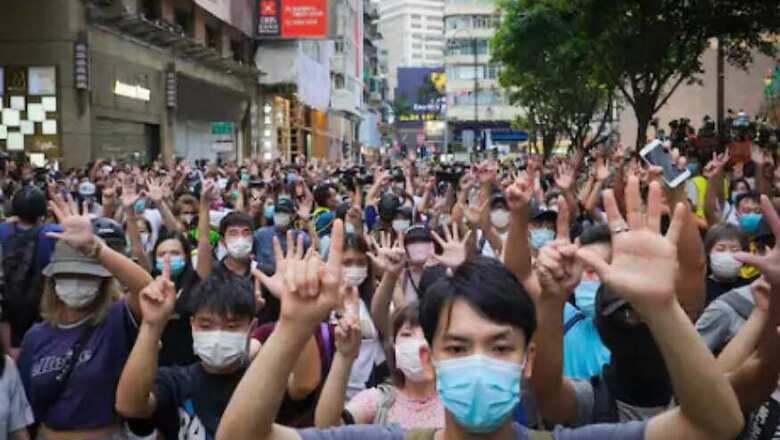
views
The world must stand in solidarity with Hong Kongers after Beijing imposed a sweeping national security law on the semi-autonomous city, activist Joshua Wong said Monday, vowing to continue campaigning for democracy.
Wong, one of the city's most prominent young activists, was speaking outside a court where he and fellow campaigners were being prosecuted for involvement in civil unrest which rocked Hong Kong last year.
China enacted the security law for the restless city last week, banning acts of subversion, secession, terrorism and collusion with foreign forces.
The law has sent a wave of fear through Hong Kong, and criminalised certain opinions such as calls for independence or autonomy.
At his court appearance on Tuesday, Wong, 23, remained unbowed.
"We still have to let the world know that now is the time to stand with Hong Kong," he told reporters, adding that China could not "ignore and silence the voice of Hong Kong people".
"With the belief of Hong Kong people to fight for freedom, we will never give up and surrender to Beijing."
Wong -- who began campaigning for democracy when he was just 12 -- is often vilified by China's state media as a "black hand" conspiring with foreign forces to undermine the nation.
Beijing has been incensed by Wong and others meeting Western politicians and supporting sanctions in response to China's tightening control over the city.
The new security law specifically outlaws lobbying for sanctions.
Wong steered clear of any mention of sanctions in his remarks on Monday, instead sticking to more general comments about not turning a blind eye to what is happening in Hong Kong.
"We also encourage the global community to let our voice be heard around the world," he said.
The national security law, imposed on Tuesday, is the most radical shift in how Hong Kong is run since it was handed back to China by Britain in 1997.
Under the handover deal, Beijing promised Hong Kong could keep key civil liberties, as well as judicial and legislative autonomy, for 50 years.
The new law has changed that landscape.
It empowers China's security agents to operate openly in the city, toppling the legal firewall that has existed between the mainland's party-controlled courts and Hong Kong's independent judiciary.
Beijing has also said it will have jurisdiction over especially "serious" prosecutions.
At a separate court hearing on Monday, the first person to be charged with national security crimes was remanded into custody.
Tong Ying-kit, 23, has been charged with terrorism and inciting secession after he allegedly drove a motorbike flying a protest flag last week into a group of police, wounding three.
China says the powers will restore stability after a year of pro-democracy protests, will not stifle freedoms, and will only target a "very small minority".
But police have arrested people for possessing anything carrying slogans pushing independence or greater autonomy, and businesses have scrambled to scrub protest displays.
Over the weekend, public libraries removed a number of books written by dissidents, including a title by Wong, to review whether they complied with the new law.
Wong's political party Demosisto announced it was disbanding last Tuesday. Its co-founder Nathan Law, another prominent former student leader, announced two days later that he had fled Hong Kong.
Wong has remained in the city, where he faces ongoing prosecutions over last year's protests.
On Monday, he was in court alongside Agnes Chow and Ivan Lam to face three unlawful assembly charges.
Chow -- a young activist who once won a seat in Hong Kong's legislature but was disqualified for supporting self-determination -- pleaded guilty. Lam pleaded not guilty as did Wong, who previously served jail time for his involvement in protests in 2014.



















Comments
0 comment